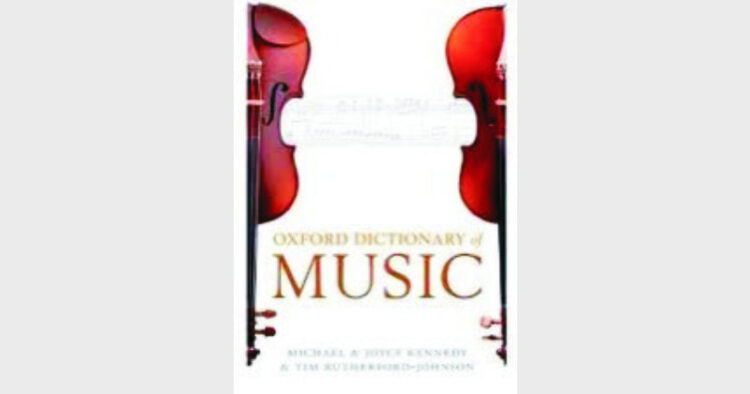Dr R Balashankar
Oxford Dictionary of Music, Michael and Joyce Kennedy and Tim Rutherford-Johnson, Oxford University Press, Pp 955 (HB), £30.00
The Oxford Dictionary of Music is a one-stop source to get familiar with terms, styles, composers etc on music, especially Western. Sample a few: ‘Madrigal’ is an Italian pastoral-origin vocal composition. They were first sung in Italy around 13th century. Kayagum is one of the best known Korean instruments, a zither. It is similar to the Japanese koto “with silk strands stretched over long wooden soundboard, each with a movable bridge and plucked with fingers.” The violin, the so familiar instrument in Indian music originated in Italy some time before 1550. It was perfected (making) by one man, Antonio Stradivari, of north Italy. Between 1690 and 1737 he made 1,116 instruments, the last at the age of 92 in 1737. Of these 600 are still in existence. An original Stradivari can fetch an astonishing sum today.
The several terms used in music, including those that are not in vogue are explained in the dictionary. A whole lot of musical instruments from world over find mention. Tabla, Veena (Vina), harmonium (it is of French origin), harp, you name it the dictionary has it.
Composers, both masters and the lesser known names abound. Read the amazing story of Strauss (1864-1949). He had pianoforte lessons when he was four, and began composing at six. He had violin lessons at eight. He did not go to any formal music academy. He was both a composer and conductor and was a master of several musical forms. There are several such mesmerising stories. The dictionary also has details of conductors and performers, directors, critics, producers and designers, music journals, and publications. It also has thematic entries such as musicology, acoustics, and absolute pitch and historical periods.
Indian composers, performers and journals do not figure at all in the lists. Such important names of the carnatic music such as the trinity Tyagaraja, Muthuswamy Dikshitar and Shyama Shastri. None of the doyens of Indian music are listed among the list of composers/musicians. Hope the Oxford would rectify this in the next edition.
This is the sixth edition and builds on the Concise Oxford Dictionary of Music, which has seen five editions. “That Concise Dictionary had, by the time of its Fifth Edition (by Michael and Joyce Kennedy, 2006), outgrown its supposedly bigger sibling and the simple decision was taken to drop the adjective and remove the anachronism,” says the Preface. This edition by the Kennedy’s is edited by Tim Rutherford-Johnson. Tim has published and lectured on several contemporary composers, and regularly reviews new music. Michael Kennedy a music critic of long standing has written several books on musicians. He is an authority on English music of the 20th century. Joyce Bourne Kennedy, a general medical practitioner for 30 years has had life-long interest in music. She has published a book Who’s Who in Opera.
What could add value to the dictionary are illustrations — of instruments and persons and also more references from the rich Indian music. An introduction on contemporary music would help greatly. As such, the dictionary is a music lover’s delight.
(Oxford University Press, Great Clarendon Street, Oxford OX2 6DP)














Comments